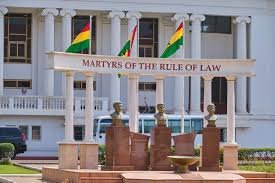The Supreme Court is set to deliver a landmark ruling today, Tuesday, November 12, on the controversial decision by the Speaker of Parliament, Alban Bagbin, to declare four parliamentary seats vacant.
This follows a legal battle sparked by Bagbin’s unilateral declaration, which has raised questions about the Speaker’s authority and the constitutional process for determining parliamentary vacancies.
Counsel for the Speaker, Thaddeus Sory, failed to appear in court on Monday, November 11 and did not submit the required statement of the case.
This absence comes after the Attorney-General raised concerns about the legality of Sory’s continued representation of the Speaker, arguing that the Public Procurement Authority had not approved the engagement.
The case was initiated by Alexander Afenyo-Markin, the leader of the New Patriotic Party (NPP) parliamentary caucus.
Afenyo-Markin is challenging Bagbin’s decision, which was made without judicial oversight or the initiation of by-elections.
The Majority Leader contends that the Speaker exceeded his constitutional powers in declaring the seats vacant without following due process.
At the center of the dispute is Speaker Bagbin’s interpretation of the 1992 Constitution regarding parliamentary vacancies.
On October 17, 2024, Bagbin declared the seats vacant, claiming that the Members of Parliament (MPs) in question had violated constitutional requirements, thus justifying their removal from office.
However, Afenyo-Markin argues that this decision bypassed the judicial process and encroached upon the judiciary’s role in interpreting the Constitution.
Afenyo-Markin insists that the power to declare seats vacant lies with the judiciary, not the Speaker, and that Bagbin’s actions effectively disenfranchised the affected constituents by denying them proper representation in Parliament.
He argues that such decisions should be made through judicial review rather than unilateral executive actions by the Speaker.
In response to Afenyo-Markin’s suit, the Supreme Court issued an injunction preventing any further action on the vacant seats until a final judgment could be delivered.
Speaker Bagbin subsequently filed a motion to reverse the injunction, arguing that it infringed upon his duties as Speaker. However, the Supreme Court dismissed his motion, upholding its previous injunction.
With today’s judgment looming, the court’s decision is expected to have significant implications for parliamentary procedures and the balance of power between the Speaker and the judiciary.

























